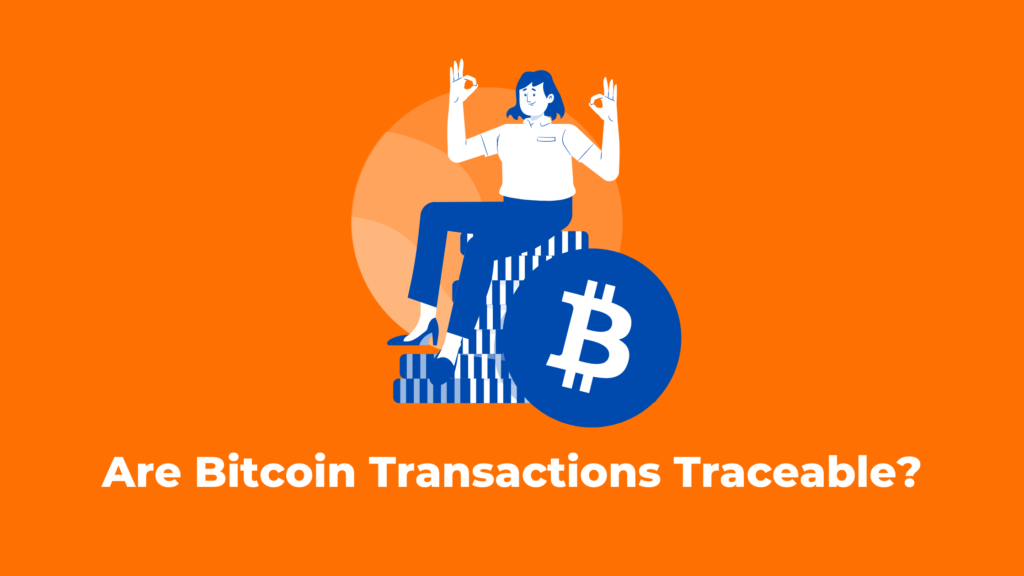When it comes to Bitcoin, there are mixed opinions about its traceability. While some argue that all Bitcoin transactions are public and therefore traceable, others believe that Bitcoin transactions can be anonymous. So, what is the truth? Are Bitcoin transactions traceable? And if so, to what extent?
Yes. In fact, every single Bitcoin transaction is traceable. All transactions are recorded on the blockchain, which is a public ledger containing all Bitcoin transactions ever executed.
How is Bitcoin Transactions Traceable?
Regarding Bitcoin, transactions are not as anonymous as one might think. In fact, all Bitcoin transactions are stored on a public ledger called the blockchain. This means that anyone can view the transaction history of any Bitcoin address.
While the identities of the parties involved in a transaction may not be known, it is still possible to trace a transaction back to a specific person or entity. This is because each Bitcoin address is associated with a real-world identity. For example, if you use your Coinbase account to buy Bitcoin, your Coinbase account will be linked to your real-world identity.
This means that if someone were to try and launder money by sending Bitcoin from a Coinbase account to an anonymous wallet, they would ultimately be traceable back to their real-world identity.
Who You Can Trace Bitcoin Transactions?
When it comes to Bitcoin, transaction traceability is a contentious issue. Some people believe that Bitcoin transactions are untraceable, while others argue that they can be traced back to their origin. So, who is right?
It depends on how you define “traceability.” If you mean that every single Bitcoin transaction can be traced back to its original source, then yes, they are traceable. However, if you mean that every single Bitcoin transaction is publicly available and easy to track, then no, they are not always traceable.
Bitcoin transactions are stored on a public ledger called the blockchain. Anyone can view the blockchain and see all of the past transactions that have taken place. However, the identity of the people involved in those transactions is not always clear.
Why Would Someone Want to Trace a Bitcoin Transaction?
When a user sends Bitcoin to another user, the transaction is recorded on the blockchain. The blockchain is a decentralized ledger that records all Bitcoin transactions. The network of Bitcoin users verifies each transaction and each transaction is given a unique ID.
The ID for a Bitcoin transaction can be used to trace the transaction. This can be useful for law enforcement agencies investigating illegal activity or for businesses trying to track down lost or stolen Bitcoin. Traceability also allows businesses to comply with AML/KYC regulations.
What is blockchain?
The blockchain is a decentralized ledger that records all Bitcoin transactions.
Are bitcoin transactions anonymous?
When it comes to Bitcoin, transactions are not anonymous. In fact, every single transaction that has ever been made using Bitcoin is stored on a public ledger known as the blockchain. This means that anyone can see the details of any Bitcoin transaction that has ever taken place.
However, while the details of each transaction are public, the identity of the people involved in them is not. This is because Bitcoin addresses are not linked to real-world identities. So, while it is possible to trace a particular transaction back to a specific address, it is not possible to know who was behind that address without access to additional information.
There are some methods that can be used to try and deanonymize Bitcoin users, but they are often inaccurate and/or unreliable.
Conclusion
While Bitcoin transactions are not entirely anonymous, they are pseudonymous. This means that while your identity is not attached to your Bitcoin wallet, all of your transactions are still public and traceable. While this may not be ideal for those seeking true anonymity, it does provide some level of privacy.
Overall, whether or not Bitcoin transactions are traceable comes down to how you use the cryptocurrency. If you take measures to ensure your identity is not attached to your wallet, then your transactions will be more difficult to trace. However, if you do not take these precautions, then your transactions could be easily traced back to you.

Pardeep is the founder and editor of Small Investment Ideas. He believes that everyone can change their life with the help of small investments and achieve financial freedom.


